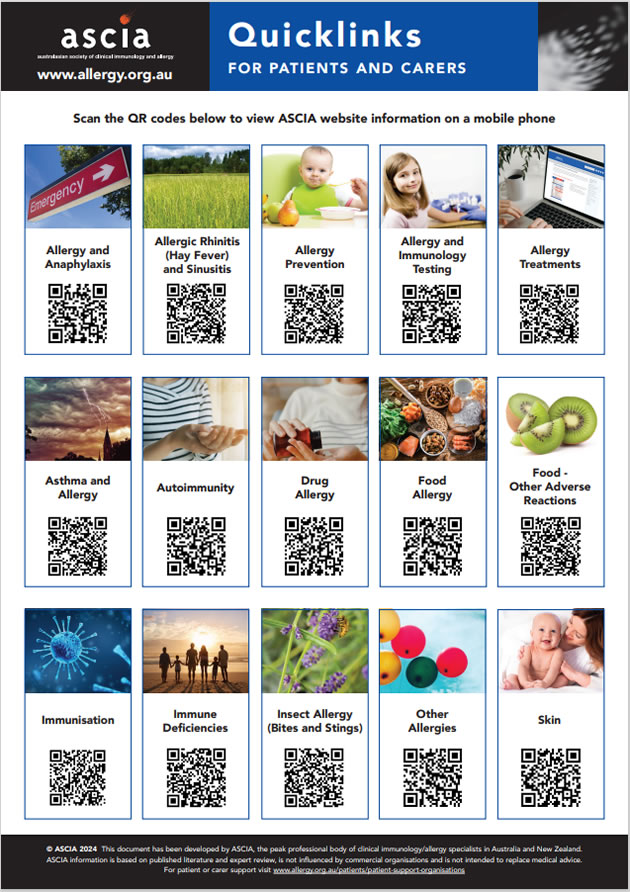Current ASCIA Action Plans are the 2023 versions. However, prior versions (2022 and 2021) are still valid for use in 2024. It is expected that it will take around 6-12 months to phase in the use of the new 2023 plans.
The plans are available open access on the ASCIA website:
ASCIA anaphylaxis e-training courses were updated in mid 2023 to include the 2023 versions of the plans:
- E-training for Schools and Children’s Education/Care
- E-training for First Aid/ Community
- E-training for Health Professionals
- E-training for Victorian Schools:
- E-training for Pharmacists:
ASCIA developed new 2023 versions of ASCIA Action Plans for Anaphylaxis, to improve ease of use. This is the first major formatting change in 20 years, since ASCIA Action Plans for Anaphylaxis were first introduced in 2003.
Whilst the signs of, and actions for anaphylaxis are unchanged, other updates have been made to improve ease of use:
- Patient specific details are all completed in the top section.*
- Signs of, and actions for mild to moderate allergic reactions are in two easy to follow lists.
- Wording about allergen exposure is included in the asthma section at the end of the plan.
- Instructions for adrenaline injectors are colour coded.
- Instructions for both adrenaline injectors are included in the General version of the plan.
- Device specific versions of the plan for Anapen® and EpiPen® include changes 1-4 listed above and a QR code which links to short animated videos with adrenaline injector instructions.
* This formatting may also facilitate use with some EMR systems, subject to approval by ASCIA.
The format of the following plans have also been updated to be consistent with the 2023 versions of the red ASCIA Action Plan for Anaphylaxis:
- ASCIA Action Plan for Allergic Reactions (green)
- ASCIA Action Plan for Drug (Medication) Allergy (dark green)
- ASCIA First Aid Plan for Anaphylaxis (orange)
- ASCIA Travel Plan for People at Risk of Anaphylaxis (red) for use with the red ASCIA Action Plan for Anaphylaxis
A summary of updates is available here.
 ASCIA Action Plan for Anaphylaxis 2023 - What's New431.38 KB
ASCIA Action Plan for Anaphylaxis 2023 - What's New431.38 KB
 ASCIA Action Plan Allergic Reactions 2023 - What's New321.66 KB
ASCIA Action Plan Allergic Reactions 2023 - What's New321.66 KB
 ASCIA Action Plan Drug Allergy 2023 - What's New338.87 KB
ASCIA Action Plan Drug Allergy 2023 - What's New338.87 KB
 ASCIA First Aid Plan Anaphylaxis 2023 - What's New415.79 KB
ASCIA First Aid Plan Anaphylaxis 2023 - What's New415.79 KB
 ASCIA Travel Plan Anaphylaxis 2023 - What's New398.97 KB
ASCIA Travel Plan Anaphylaxis 2023 - What's New398.97 KB
All ASCIA Action, First Aid, Management, Transfer, Travel and Treatment Plans are available free of charge on the ASCIA website as PDFs that can be ompleted online, download and print at https://www.allergy.org.au/hp/ascia-plans-action-and-treatment
Health professionals can order hard copies (in full colour) of red ASCIA Action Plans for Anaphylaxis (General version - with instructions for Anapen and EpiPen), by submitting an order online using the HCP shop on the Anapen website - https://anapen.com.au/shop/. Password – arrotex. Alternatively, contact an Arrotex representative or contact Arrotex (distributor of Anapen in Australia) at This email address is being protected from spambots. You need JavaScript enabled to view it. or by calling 1800 761 964.
Health professionals can order hard copies (in full colour) of red ASCIA Action Plans for Anaphylaxis (EpiPen version), green ASCIA Action Plans for Allergic Reactions and orange ASCIA First Aid Plan for Anaphylaxis (EpiPen version) by emailing Viatris Customer Service (distributor of EpiPen in Australia) at This email address is being protected from spambots. You need JavaScript enabled to view it. or by calling 1800 274 276.
For further information about ASCIA Action Plans and other anaphylaxis resources go to www.allergy.org.au/anaphylaxis
Recently updated Best Practice Guidelines for Schools and Early Childhood Education/Care Centres are available here:
https://allergyaware.org.au/best-practice-guidelines-for-anaphylaxis-prevention-and-management
Continue reading

 Each of the following webpages include a QR code directly below the instructions "Scan the QR codes below to view ASCIA information on a mobile phone:"
Each of the following webpages include a QR code directly below the instructions "Scan the QR codes below to view ASCIA information on a mobile phone:"